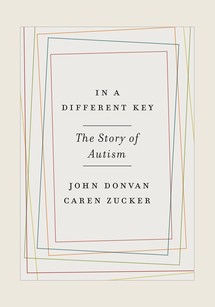In a Different Key: The Story of Autism
By John Donvan and Caren Zucker
688 pages;
Crown
Parents say: One day he stopped calling me "mama." They say: For months he had a bruise the size of an egg on his forehead because he kept banging his head on the floor. They say: I thought she was okay because she made eye contact.
In the U.S., one in 68 children is born with some form of autism. Despite the current argument that people on the autism spectrum are not worse off or disabled, but different, and often gifted, autism can be terrifying for parents. Even for higher-functioning children, communication is affected, often love won't be expressed conventionally, and relationships may be difficult, or impossible. At the profoundly impacted end, children who require round-the-clock attention can grow into fragile, dependent adults incapable of self-care or speech. None of these families has it easy.
In a Different Key: The Story of Autism, by John Donvan and Caren Zucker (Crown), offers a full social and medical history of the disorder, replete with heroic parents, occasional villains, and decades of media storms. The book grew out of an article the authors wrote for The Atlantic on autism's patient zero, Donald Triplett. After an early childhood beset with serious symptoms, Triplett survived institutionalization to graduate from college, work in the family bank, drive, flirt awkwardly, and adore golf.
Donvan and Zucker take us beyond Triplett to well-known figures in autism's history (Leo Kanner, Triplett's doctor, ambitious and frequently mistaken, but also deeply caring; the activist Temple Grandin) as well as the remarkable, not-at-all-famous people who refused to give up in the face of insults (being labeled "refrigerator mothers," blamed for causing autism due to a lack of maternal warmth), indifference, and hostile, wrongheaded policy. They examine the evolution and eventual debunking of facilitated communication and the vaccine-autism link. (To repeat: There is no link at all—and never was.)
This is not a how-to guide or a polemic on neurodiversity. The book probes a difficult subject with intelligence and compassion—and makes you think. The complete absence of hysteria will make it essential reading for many. And while there is no cookie-cutter solution provided, its insights and quiet wisdom demand our attention, and gratitude.
— Amy Bloom


